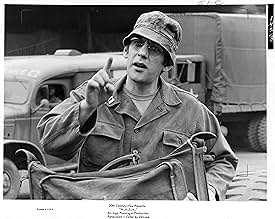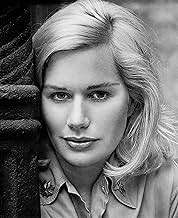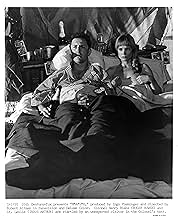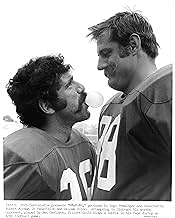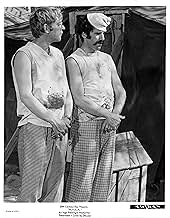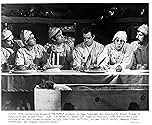El personal de un hospital de la Guerra de Corea usa el humor para mantener su cordura frente al horror de la guerra.El personal de un hospital de la Guerra de Corea usa el humor para mantener su cordura frente al horror de la guerra.El personal de un hospital de la Guerra de Corea usa el humor para mantener su cordura frente al horror de la guerra.
- Dirección
- Guionistas
- Elenco
- Ganó 1 premio Óscar
- 15 premios ganados y 26 nominaciones en total
Timothy Brown
- Cpl. Judson
- (as Tim Brown)
- Dirección
- Guionistas
- Todo el elenco y el equipo
- Producción, taquilla y más en IMDbPro
Resumen
Reviewers say 'M*A*S*H' is a groundbreaking film blending black comedy with political satire, tackling war, religion, and societal norms. Praised for its innovative style and performances by Donald Sutherland and Elliott Gould, it's seen as a significant cultural artifact. However, some find its humor dated and characters unlikable. Its anti-war message and portrayal of gender and racial issues elicit mixed reactions, highlighting its complex legacy.
Opiniones destacadas
No, not the very wonderful TV series. The Robert Altman film with Donald Sutherland as Hawkeye, Elliott Gould as Trapper John, and Radar as Radar. This is a dark comedy, but it's a delight from beginning to end. And even more effectively than the TV show, the movie illustrates the complete insanity of war. (But even the movie doesn't depict Jesus on the cross hanging from a helicopter. For that you'll need to read the book.) Like most Altman films, this one is episodic. It's also gritty, grim, bloody, offensive, and charming. And Frank Burns (Robert Duvall) is not a character watered down and humanized for television. This is an example of a film so rich in detail (like Altman's "Popeye," come to think of it) that it demands multiple viewings.
And then there was Korea. In an understaffed and overstretched medical camp Lt Col Blake puts an order in for more surgeons. Dispatched to him in a stolen army jeep are Captain's Hawkeye Pierce and Duke Forrest who immediately start chasing the nursing staff and annoying their tent mate Major Burns. When chest cutter Trapper John McIntyre joins them in the camp it starts a working practice that ignores authority and tries to find as much fun as possible in the middle of their bloody war.
I had watched the TV show for a long time before I finally got to watch the movie - I prefer the cynical comedy of the film although I have always loved the more sitcom style approach of the series. Many critics have hailed this as an anti-war film that exposes the brutal effects of war; to some extent I suppose that is true but it is far from being a part of the main narrative - even to call it a theme would be generous! It does have some scenes of blood and gore but it is far from having anything substantial to say about the cruelty of war.
Instead I always find this film to be a very episodic, freewheeling comedy, some bits of which work and some others don't. On the whole it is pretty funny and uses the sort of sporadic dialogue and action to move it forward. At times it is based on imaginative banter between Trapper and Hawkeye and at others it is out and out slapstick such as the chaotic game of American football at the end of the film. The downside of this is that sections of it just don't work - Painless Paul's dilemma is pretty uninspiring at least - however, on the whole it is energetic and very funny. Altman's use of overlapping dialogue and his usual use of overlapping scenes as opposed to a traditional narrative flow is good here but it would have been better if it had been toned down somewhat.
The cast is what really carries the film - the plot is weak and they have no characters other than what they create themselves and, although the dialogue is good, I couldn't help the feeling that the cast did as much as the writers. As such the lead two of Sutherland and Gould stand out as great comedians with great witty touches, their characters are the largest and their lines are the funniest. Skerritt starts out as equal to them but quickly becomes a third wheel despite still giving a good performance. The support cast are all a good mix of characters whether they be played by actors such as Duvall and Kellerman or less well known faces such as Burghoff or Bowen.
Overall, I am still unable to see what those who call this a `brutal anti-war film' see but that doesn't mean I can't enjoy it as a comedy. As such though, it is very episodic and really lacks a solid narrative flow meaning that any 10 minute period could be good or bad. Aside from this lack of substance it is a funny, enjoyable comedy but it doesn't deserve the classic reputation that it has obtained.
I had watched the TV show for a long time before I finally got to watch the movie - I prefer the cynical comedy of the film although I have always loved the more sitcom style approach of the series. Many critics have hailed this as an anti-war film that exposes the brutal effects of war; to some extent I suppose that is true but it is far from being a part of the main narrative - even to call it a theme would be generous! It does have some scenes of blood and gore but it is far from having anything substantial to say about the cruelty of war.
Instead I always find this film to be a very episodic, freewheeling comedy, some bits of which work and some others don't. On the whole it is pretty funny and uses the sort of sporadic dialogue and action to move it forward. At times it is based on imaginative banter between Trapper and Hawkeye and at others it is out and out slapstick such as the chaotic game of American football at the end of the film. The downside of this is that sections of it just don't work - Painless Paul's dilemma is pretty uninspiring at least - however, on the whole it is energetic and very funny. Altman's use of overlapping dialogue and his usual use of overlapping scenes as opposed to a traditional narrative flow is good here but it would have been better if it had been toned down somewhat.
The cast is what really carries the film - the plot is weak and they have no characters other than what they create themselves and, although the dialogue is good, I couldn't help the feeling that the cast did as much as the writers. As such the lead two of Sutherland and Gould stand out as great comedians with great witty touches, their characters are the largest and their lines are the funniest. Skerritt starts out as equal to them but quickly becomes a third wheel despite still giving a good performance. The support cast are all a good mix of characters whether they be played by actors such as Duvall and Kellerman or less well known faces such as Burghoff or Bowen.
Overall, I am still unable to see what those who call this a `brutal anti-war film' see but that doesn't mean I can't enjoy it as a comedy. As such though, it is very episodic and really lacks a solid narrative flow meaning that any 10 minute period could be good or bad. Aside from this lack of substance it is a funny, enjoyable comedy but it doesn't deserve the classic reputation that it has obtained.
M*A*S*H is a groundbreaking film. Along with Catch 22, M*A*S*H had the audacity to ridicule two of the pillars of American society: war and religion. Whether you find this appalling, subversive, treasonous, outrageous or funny depends on your political and religious orientation. Surely the religious right will find the film blasphemous and the political right will find it treasonous. No matter what your point of view, M*A*S*H is certainly an in-your-face film.
The irony of the film is that for the time it was considered gruesomely bloody. Yet there are no battlefield scenes; all the blood is in the surgical unit. The CSI TV series shows more carnage than M*A*S*H, but M*A*S*H was filmed over 30 years ago.
M*A*S*H is loaded with bizarro characters. Donald Sutherland, Elliot Gould, Robert Duvall, Tom Skerrit, Loretta Swit, Radar are all insane in their own way. In "M*A*S*H," everyone is cruel, playing mean practical jokes and the anti-heroes Donald Sutherland and Elliott Gould are just plain heartless. They absolutely torment Major "Hot Lips" Hoolihan and Robert Duvall. None of the characters in the film tries to be funny. There are no jokes. The humor just grows from the situation which is the grim reality of a mobile surgical unit whose doctors and nurses try their best to repair the horribly mutilated bodies from an insane war. Having worked in a hospital setting, outrageous and black humor is commonplace, especially in the ER, but in M*A*S*H it's taken to a new level.
The irony of the film is that for the time it was considered gruesomely bloody. Yet there are no battlefield scenes; all the blood is in the surgical unit. The CSI TV series shows more carnage than M*A*S*H, but M*A*S*H was filmed over 30 years ago.
M*A*S*H is loaded with bizarro characters. Donald Sutherland, Elliot Gould, Robert Duvall, Tom Skerrit, Loretta Swit, Radar are all insane in their own way. In "M*A*S*H," everyone is cruel, playing mean practical jokes and the anti-heroes Donald Sutherland and Elliott Gould are just plain heartless. They absolutely torment Major "Hot Lips" Hoolihan and Robert Duvall. None of the characters in the film tries to be funny. There are no jokes. The humor just grows from the situation which is the grim reality of a mobile surgical unit whose doctors and nurses try their best to repair the horribly mutilated bodies from an insane war. Having worked in a hospital setting, outrageous and black humor is commonplace, especially in the ER, but in M*A*S*H it's taken to a new level.
"MASH" broke barriers and defied conventions when it was first released in 1970. It still does today.
The pendulum has swung back a lot since 1970, and for that you still get a sense of the pioneering spirit with which the film was made. The overlapping dialogue. The non-linear, character-driven plot. The caustic humor. The attacks on religion (real religion, as the New York Times noted when the film came out, not false sanctimony but actual belief in God.)
Yes, in those ways the film is as powerful now as it was when it was first released. But you see something else, something audiences didn't see in 1970, so blown away were they by the newness of it. That is the picture runs out of gas halfway through.
You have a powerful beginning, that eerie montage with the strange song "Suicide Is Painless" playing mournfully while doctors, nurses, and orderlies silently rush to relieve choppers of their human cargo. It's quietly effective, immediately giving you a sense of the 4077th MASH unit (looking much bigger and grimmer than it ever did in the TV series) and coming as close as the movie ever does to delivering an effective anti-war statement. The movie builds from there as we meet the various characters, beneficiaries of their actors' strong improvisational work. It feels like real-time eavesdropping on a community of actual human beings. Scenes like Major Burns and Hot Lips' transmitted tryst and Painless Pole's suicide attempt are not as funny as we are meant to think, but they are well shot, especially the Painless Pole bit, the best thing in the movie for pure entertainment. The way all the guys in the Swamp crack up when Painless tells them he's decided to kill himself may be the film's funniest moment.
What happens next feels like a wrong turn. Hot Lips becomes the subject of a camp bet that exposes her to massive humiliation. Call it "indecent" or "politically incorrect," it is just plain wrong, exposing the film's (and its director's) nasty streak toward women and alienating any concern you might have built up for the characters. When she and Burns were targeted before, you had a sense they had it coming because of her overbearing military approach and his blaming orderly Boone for killing a patient. This time, she's a spent force, no threat to anyone, and "a damn good nurse," as Trapper says, just doing her job as best she can despite her earlier bad experience. I'm struck dumb at the idea I'm supposed to be laughing when she rushes into Col. Blake's tent in shock and tears.
The film never recovers. Instead, it veers wildly off course, away from the camp and into two radically pointless subplots, one involving a trip by Hawkeye and Trapper to Japan where they operate on a congressman's son and a sick infant (some sort of parallel there, though lost on me), the other a football game that apparently was director Robert Altman's comment on the folly of war, but to me just shows what happens when you allow your characters to veer off-script for so long you can't make it back to the ending as written. The game takes up too much time, throws in goofy circus music complete with slide whistles, and features the once iron-willed Hot Lips in the role of outlandishly enthusiastic cheerleader for all the people who tormented her so viciously for the duration of the film. Sally Kellerman's performance in the second half of the film is nothing like it was in the first half; it's embarrassingly, cartoonishly bad. Altman should have reined her in, but you get the feeling he was just rushing by then to get it all in the can before the studio figured out what he was up to and took his film away.
Altman was just so much better making "Nashville." Obviously he learned a lot. It's amazing how pasty everyone in this film looks, particularly Donald Sutherland, who seems leprous. No wonder he tried to get Altman fired. So much of the supporting players faded away, and though they do good work, it's not a surprise. They all seem so squalid and ugly as Altman shoots them.
It's interesting comparing the characters here to their counterparts in the TV series. For me, the TV characters are usually preferable. Robert Duvall mines zero comedy from Frank Burns, playing him very seriously in comparison to Larry Linville's more likeably miserable TV Burns. Roger Bowen had a great voice, but is nearly robotic as Blake, having none of McLean Stevenson's panache. What's worse than a pompous moralizing Hawkeye with Groucho affectations? How about that annoying whistle! Even Gary Burghoff, the one real holdover from film to series, plays a nastier Radar in the movie, meaner, tougher, less innocent.
The whole film is mean, tough, less innocent. It gets points from me for that. Altman and his cast develop a magnificent mood right away. But they fail to do very much with it. "MASH" is a great 45-minute-long movie that just goes on too long.
The pendulum has swung back a lot since 1970, and for that you still get a sense of the pioneering spirit with which the film was made. The overlapping dialogue. The non-linear, character-driven plot. The caustic humor. The attacks on religion (real religion, as the New York Times noted when the film came out, not false sanctimony but actual belief in God.)
Yes, in those ways the film is as powerful now as it was when it was first released. But you see something else, something audiences didn't see in 1970, so blown away were they by the newness of it. That is the picture runs out of gas halfway through.
You have a powerful beginning, that eerie montage with the strange song "Suicide Is Painless" playing mournfully while doctors, nurses, and orderlies silently rush to relieve choppers of their human cargo. It's quietly effective, immediately giving you a sense of the 4077th MASH unit (looking much bigger and grimmer than it ever did in the TV series) and coming as close as the movie ever does to delivering an effective anti-war statement. The movie builds from there as we meet the various characters, beneficiaries of their actors' strong improvisational work. It feels like real-time eavesdropping on a community of actual human beings. Scenes like Major Burns and Hot Lips' transmitted tryst and Painless Pole's suicide attempt are not as funny as we are meant to think, but they are well shot, especially the Painless Pole bit, the best thing in the movie for pure entertainment. The way all the guys in the Swamp crack up when Painless tells them he's decided to kill himself may be the film's funniest moment.
What happens next feels like a wrong turn. Hot Lips becomes the subject of a camp bet that exposes her to massive humiliation. Call it "indecent" or "politically incorrect," it is just plain wrong, exposing the film's (and its director's) nasty streak toward women and alienating any concern you might have built up for the characters. When she and Burns were targeted before, you had a sense they had it coming because of her overbearing military approach and his blaming orderly Boone for killing a patient. This time, she's a spent force, no threat to anyone, and "a damn good nurse," as Trapper says, just doing her job as best she can despite her earlier bad experience. I'm struck dumb at the idea I'm supposed to be laughing when she rushes into Col. Blake's tent in shock and tears.
The film never recovers. Instead, it veers wildly off course, away from the camp and into two radically pointless subplots, one involving a trip by Hawkeye and Trapper to Japan where they operate on a congressman's son and a sick infant (some sort of parallel there, though lost on me), the other a football game that apparently was director Robert Altman's comment on the folly of war, but to me just shows what happens when you allow your characters to veer off-script for so long you can't make it back to the ending as written. The game takes up too much time, throws in goofy circus music complete with slide whistles, and features the once iron-willed Hot Lips in the role of outlandishly enthusiastic cheerleader for all the people who tormented her so viciously for the duration of the film. Sally Kellerman's performance in the second half of the film is nothing like it was in the first half; it's embarrassingly, cartoonishly bad. Altman should have reined her in, but you get the feeling he was just rushing by then to get it all in the can before the studio figured out what he was up to and took his film away.
Altman was just so much better making "Nashville." Obviously he learned a lot. It's amazing how pasty everyone in this film looks, particularly Donald Sutherland, who seems leprous. No wonder he tried to get Altman fired. So much of the supporting players faded away, and though they do good work, it's not a surprise. They all seem so squalid and ugly as Altman shoots them.
It's interesting comparing the characters here to their counterparts in the TV series. For me, the TV characters are usually preferable. Robert Duvall mines zero comedy from Frank Burns, playing him very seriously in comparison to Larry Linville's more likeably miserable TV Burns. Roger Bowen had a great voice, but is nearly robotic as Blake, having none of McLean Stevenson's panache. What's worse than a pompous moralizing Hawkeye with Groucho affectations? How about that annoying whistle! Even Gary Burghoff, the one real holdover from film to series, plays a nastier Radar in the movie, meaner, tougher, less innocent.
The whole film is mean, tough, less innocent. It gets points from me for that. Altman and his cast develop a magnificent mood right away. But they fail to do very much with it. "MASH" is a great 45-minute-long movie that just goes on too long.
"MASH" has always been one of my favorite comedies of all time. It isn't as funny as it is great (although it IS very funny), and the main reasons that I find it to be so great aren't even because I find it to be funny. Probably the main thing I love about "MASH" is the film's style. It broke the rules of mainstream cinema, and gave us something different, something new! It gave us Robert Altman, one of the greatest, most influential, and most unique filmmakers of all time. The way Altman made "MASH" is very important. He let his actors improvise and he used tons and tons of (hilarious and chaotic) overlapping dialogue. The film also has excellent cinematography, a fast pace, and an anti war message.
The gory surgery sequences seem like they belong in a horror film rather than a comedy, but they may be the most important part about the film. Without them, the characters aren't fully developed, and the powerful anti war message is completely removed. Those surgery scenes allow us to see the more serious side of the wacky, prankster characters. We get to see them get that big grin off their face, and replace all of that childish behavior with serious medical work.
"MASH" is one of the most entertaining and funny films ever made, but, more importantly, it's influential, intelligent, and an important part of film history, and one of Robert Altman's best and earliest films.
The gory surgery sequences seem like they belong in a horror film rather than a comedy, but they may be the most important part about the film. Without them, the characters aren't fully developed, and the powerful anti war message is completely removed. Those surgery scenes allow us to see the more serious side of the wacky, prankster characters. We get to see them get that big grin off their face, and replace all of that childish behavior with serious medical work.
"MASH" is one of the most entertaining and funny films ever made, but, more importantly, it's influential, intelligent, and an important part of film history, and one of Robert Altman's best and earliest films.
¿Sabías que…?
- TriviaThe fourteen-year-old son of director Robert Altman, Mike Altman, wrote the lyrics to the theme song "Suicide is Painless." Because of its inclusion in the subsequent television series, he continued to get residuals throughout its run and syndication. His father was paid $75,000 for directing, but his son eventually made about $2 million in song royalties, with payments continuing, from first syndication through the present day, as M.A.S.H. (1972) continues in syndication around the world.
- ErroresThroughout the film the characters are drinking the present 1970s style cans of Pabst Blue Ribbon and Budweiser. In fact, during the Korean Conflict, Pabst was not available overseas.
- Créditos curiososThe shot of Hot Lips being revealed in the shower was replaced with her exiting the helicopter in network and basic cable showings when Sally Kellerman's name was announced.
- Versiones alternativasSome of the scenes that were altered in the US "PG" version:
- The arterial spurting from the neck of a patient in the operating room was removed.
- When O'Houlihan is surprised in the shower, the tent flap begins to rise but the scene cuts away before seeing her.
- The "F-word" was removed from the football game.
- ConexionesEdited into Give Me Your Answer True (1987)
- Bandas sonorasSuicide Is Painless
(1970)
Music by Johnny Mandel
Lyrics by Mike Altman
Sung by an The Ron Hicklin SIngers during the opening credits
Also sung by Ken Prymus (uncredited) during the last supper scene
Selecciones populares
Inicia sesión para calificar y agrega a la lista de videos para obtener recomendaciones personalizadas
- How long is M*A*S*H?Con tecnología de Alexa
Detalles
Taquilla
- Presupuesto
- USD 3,500,000 (estimado)
- Total en EE. UU. y Canadá
- USD 81,600,000
- Total a nivel mundial
- USD 81,600,904
- Tiempo de ejecución
- 1h 56min(116 min)
- Color
- Relación de aspecto
- 2.35 : 1
Contribuir a esta página
Sugiere una edición o agrega el contenido que falta


